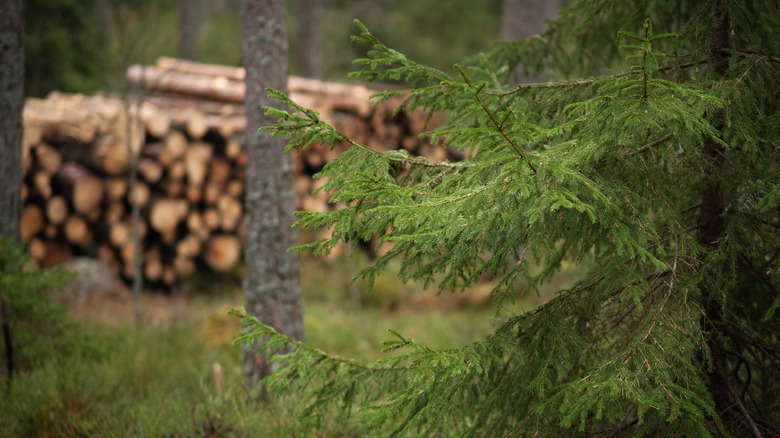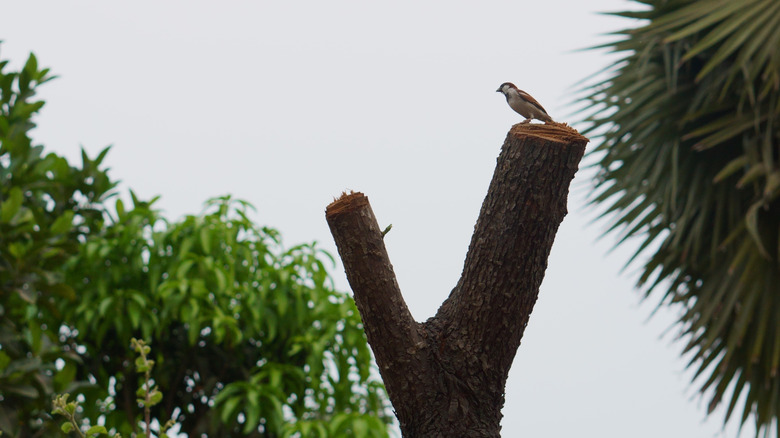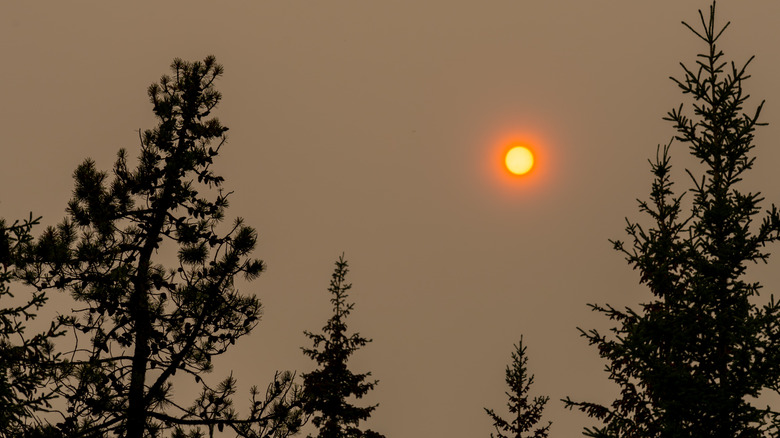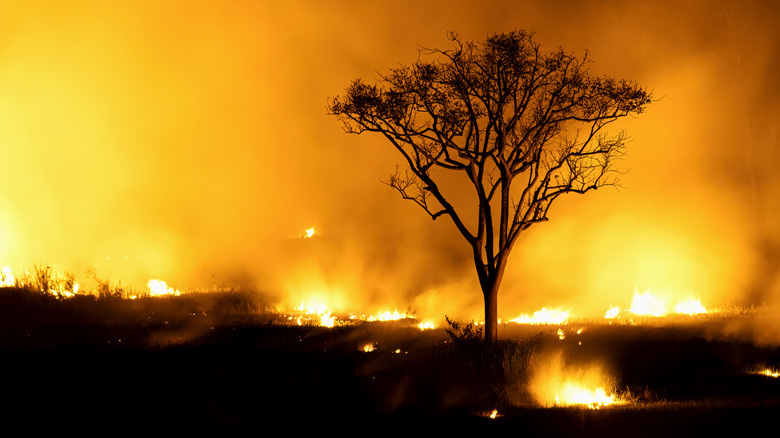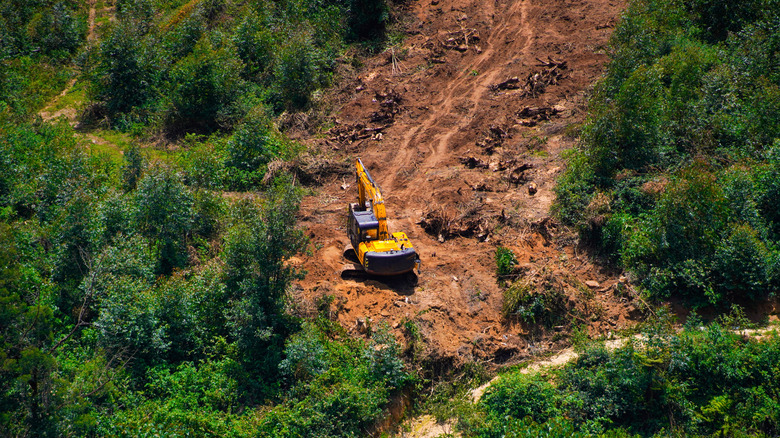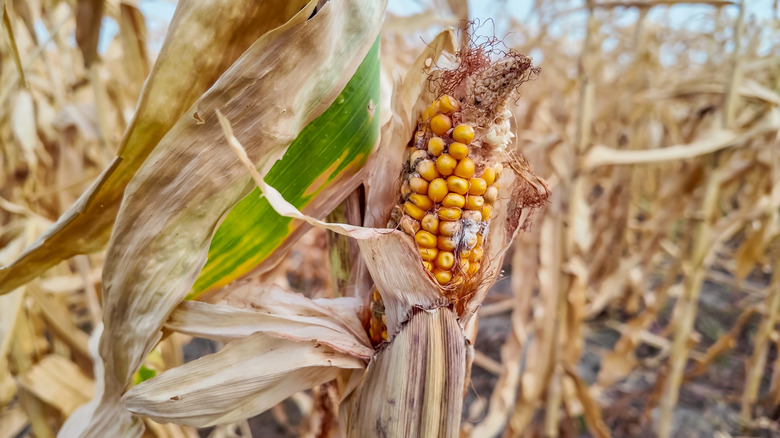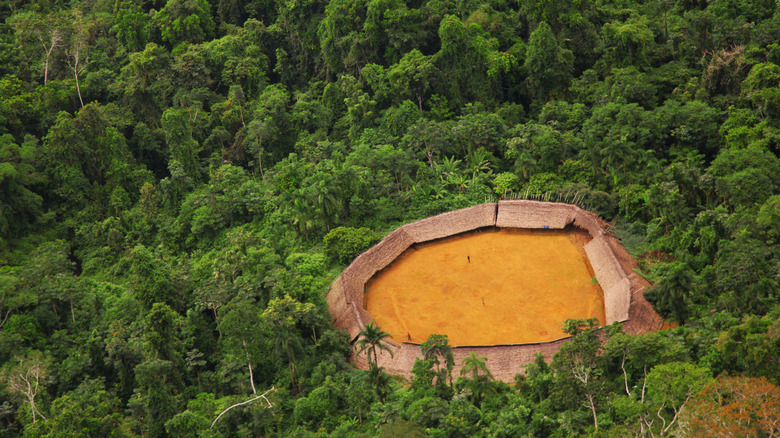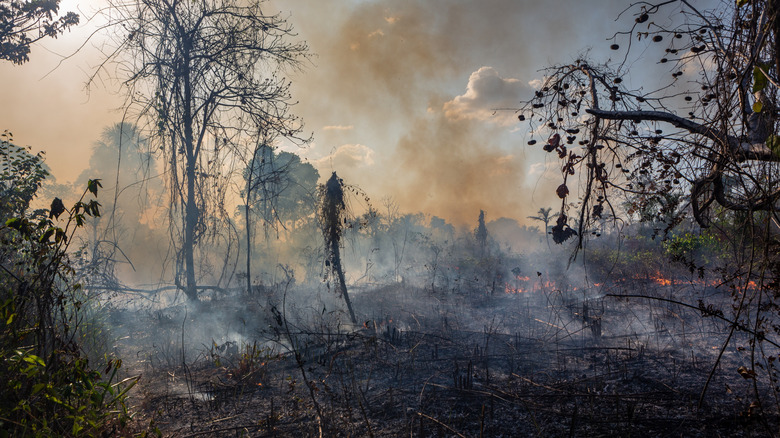What Really Happens To The Ecosystem When Trees Are Cut Down
The ecosystem is a delicate balance between all living organisms, including plants and animals, as well as the weather and climate they endure. There are also multiple ecosystem types within each major biome, including forests, grasslands, deserts, tundras, and aquatic biomes. Not all ecosystems have trees, but many of them do, making practices like deforestation especially devastating.
Deforestation is an increasingly common phenomenon that repurposes land for homes, farming, or commercial mass usage. If you've witnessed a large area of tree loss, you've probably wondered about the overall effects on the ecosystem. This is why cutting trees down in ecosystems like forests can have negative impacts in the immediate area. However, the act of cutting trees down can have larger implications worldwide, too. Mass trees losses can indeed have negative ripple effects that cannot easily be reversed with planting new trees alone. It's worth knowing the changes to ecosystems that can occur when trees are cut down, and how such damage can impact changes to the global climate.
Tree losses equate to lost habitats
Trees are cut down for a variety of reasons, including logging, land usage, and mass agricultural pursuits. Regardless of the reason though, there are numerous disadvantages of deforestation. One of the most immediate effects of tree losses are lost habitats for a variety of species. On a larger scale, deforestation of trees in tropical regions can have devastating effects on a number of animals and other life forms that rely on them within the ecosystem. In fact, more than 80% of global terrestrial wildlife call forests home. Not only does this put a variety of wildlife, such as birds, amphibians, insects, and mammals at risk of extinction, but the elimination of trees can also deplete resources for them, too.
Beyond immediate habitat losses, cutting trees can also lead to habitat fragmentation. This means there's less land and resources for wildlife to share. In the long-term, habitat fragmentation can also disrupt migration patterns and genetic diversity. Such habitat changes can also lead to more conflicts between animals and humans, sometimes with fatal outcomes.
Less oxygen and increased carbon emissions
Trees provide humans and other species with life-sustaining oxygen. In fact, it's estimated that one tree provides enough oxygen for an entire day for four people, per the USDA. Additionally, trees trap carbon dioxide (CO2) as part of the process of photosynthesis, and then release oxygen as a byproduct. Trees also store CO2 within smaller fibers, which prevents excess amounts of this gas from being released into the atmosphere. While trees are not the only life forms that release oxygen (in fact, phytoplankton in the ocean produce even more!), these plants still make up a large percentage of Earth's oxygen output.
When trees are cut down, it's understandable how the overall air quality may take a hit. This is especially true of dense forested areas, where carbon dioxide can affect the environment, too. Not only does deforestation leads to less oxygen output, but newly cut trees can also release more CO2 greenhouse gases into the atmosphere. In fact, tropical deforestation is thought to be responsible for 20% of all greenhouse gas emissions every year, according to the Environmental Defense Fund. Aside from the initial CO2 releases caused by tree cutting, the ecosystem is then left with fewer trees to help absorb CO2 more generally.
More frequent and intense wildfires
Wildfires can occur from natural phenomena, such as lightning strikes, but the majority of them are caused by humans. There are also factors that can make wildfires more intense, as well as more frequent. One such factor is deforestation. Trees can normally retain rainfall and make a forest too wet for fires to develop. Without these trees, conditions can be dry enough for fires to develop more easily, and there may be a lack of moisture to stop them.
In addition to an increased risk of wildfire development, cutting trees down can also make these incidents even worse in terms of air quality. This, of course, is partly attributed to the fires themselves, which produce toxic smoke that contains a combination of fine particulate matter (PM 2.5), lead, hydrocarbons, and nitrogen dioxide that is an endangerment for human health. These fires also produce CO2, which can worsen greenhouse gas emissions that fuel climate change. Overall, this can create a vicious cycle of more wildfires and worsening climate conditions that fuel them.
Soil erosion and dangerous flooding
Aside from poorer air quality and increased wildfire risks, cutting trees down can also negatively impact an ecosystem's soil. Trees provide numerous benefits to soil, including erosion prevention. Not only do their roots help hold soil together, but both the roots and leaves of trees can soak up precipitation. When trees are cut down though, all of this water has nowhere to go, and the soil cannot absorb rainfall efficiently on its own. In turn, this can lead to soil erosion and subsequent flooding when it does rain. This is one of the four major consequences of deforestation, too.
Soil erosion can also develop when cleared lands are overused for mass-production agricultural crops, such as wheat, coffee, and soybean plants. In fact, the World Wildlife Fund estimates that about half of the world's topsoil has been depleted over the last 150 years alone. What's more, soil erosion and flooding from deforestation may also contribute to water pollution. Such events can occur when the lack of tree presence causes runoff when rainfall occurs. Any pollutants in soil can run towards water sources and lead to contamination that can impact other species. Among these contaminants include fertilizers and pesticides.
Food shortages from fewer crops
In some cases, trees are cut down to create fields for livestock to meet the demands of meat production for humans. In other scenarios, forests are removed for plots of land to grow "cash crops," such as palm oil and cacao. These are both cases where potential sources of food may be grown and produced more readily and in high quantities. Ironically though, deforestation for these purposes is actually linked to food shortages in the long term, with related food insecurity problems at risk of increasing around the world.
When trees are removed, biodiversity within the ecosystem is reduced. This can lead to problems with diseased crops and more pests that may harm them. Additionally, deforestation impacts natural nutrients in soil, which may lead to fewer or poorer quality crops. Soil erosion is yet another problem that can cause problems with growing food, too. As a result, food may become more expensive, with shortages another real possibility.
Negative impacts for Indigenous communities worldwide
Cutting trees down as a part of deforestation undoubtedly carries ripple effects for all beings on Earth. However, while the effects of deforestation can affect people in various ways, the negative impacts are particularly dangerous for Indigenous communities. According to Cultural Survival, it's thought that 60 million Indigenous people depend on forests for their survival. Tree removal not only directly destroys habitats, but Indigenous peoples may also experience the loss of food and natural medicine, as well as key cultural sites and traditions. These groups may also be at risk for new disease development.
To understand these impacts, it's worth noting Indigenous communities that have already experienced the devastating effects of deforestation. A more recent example is the Yanomami of the Amazon forests. As National Geographic notes, the Yanomami not only have experienced a higher death rate in recent years due to exposure to miners in their habitat, but they are also at a significant risk of a loss of food, plant-based medicines, and traditions that are all directly tied to the tropical forests they inhabit. Such impacts may go beyond the Amazonian Yanomami, affecting Indigenous groups all around the world.
Worsening climate change
Collectively, many of the impacts of cutting trees down on the ecosystem can lead to worsening climate change. Increased CO2 emissions, more frequent wildfires, and soil erosion can all create a dangerous cycle that worsens the effects of climate change while also making all of these events more intense. For example, greenhouse gas levels will rise not just from pollution alone, but also from a lack of trees. It's estimated that trees absorb up to 16 billion metric tons of CO2 every year. Without trees, the trapped CO2 in their trunks, branches, leaves, and roots may all get released. In fact, the loss of forests contributed about 6% of global CO2 emissions in 2023 alone.
There are many people across the globe wanting to offset the negative effects of tree losses, including on worsening climate change. Some companies might even plant more trees elsewhere to help offset CO2 emissions to justify taking down trees in a given area. The problem with the concept of carbon offsetting is that there is no guarantee that recently planted trees will be able to survive an increasingly hot planet, let alone replace the same level of CO2 containment fully grown trees are capable of doing. Climate experts instead advocate for re-establishing forests in combination with reducing carbon emissions overall to help possibly minimize the worst impacts global warming could have in the future.
